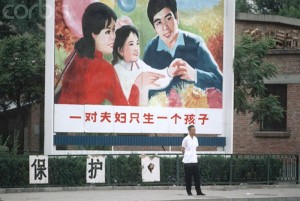China’s one child policy (计划生育政策) was implemented in 1979 to alleviate the country of impending economic, environmental and social problems. The debate over the ethical issues behind the one child policy is still extremely heated – should government have the power to limit the size of a family? What happens if an unplanned pregnancy occurs? However, recently more attention has been given towards the economic complications of this policy. Business Weekly recently focused on the policy from a business perspective here: “The byproduct of that policy is an accelerating decline in the pool of young and largely unskilled labor that is the mainstay of mainland factories churning out low-margin goods such as clothes, toys, and furniture.” Having been to ShiJiaZhuang, China this summer, I could visually notice the age in the demographic. There were even playgrounds built specifically for seniors, offering low-impact and low-risk playground equipment to exercise with. The policy is not meant to end until at least 2015, but with this amount of strain on the Chinese workforce to support the enormous population of seniors, the government may have to change the policy before 2015 for economic reasons.
Lightbulb!
Just another UBC Blogs site


Hi, this is a comment.
To delete a comment, just log in and view the post's comments. There you will have the option to edit or delete them.